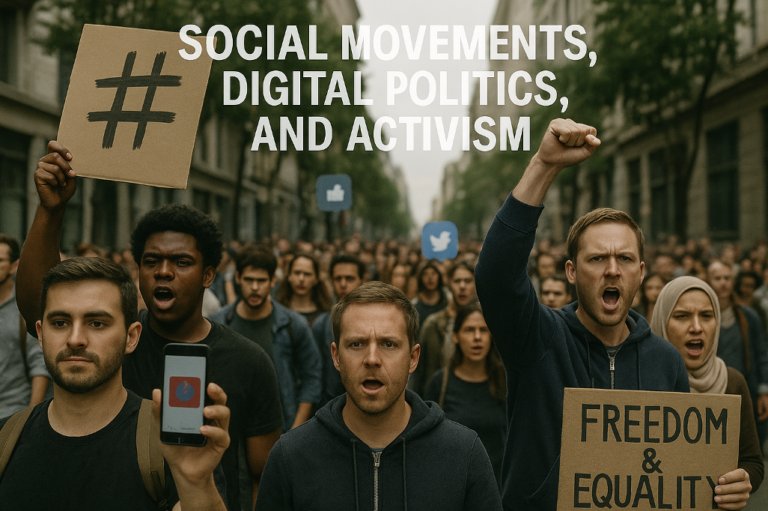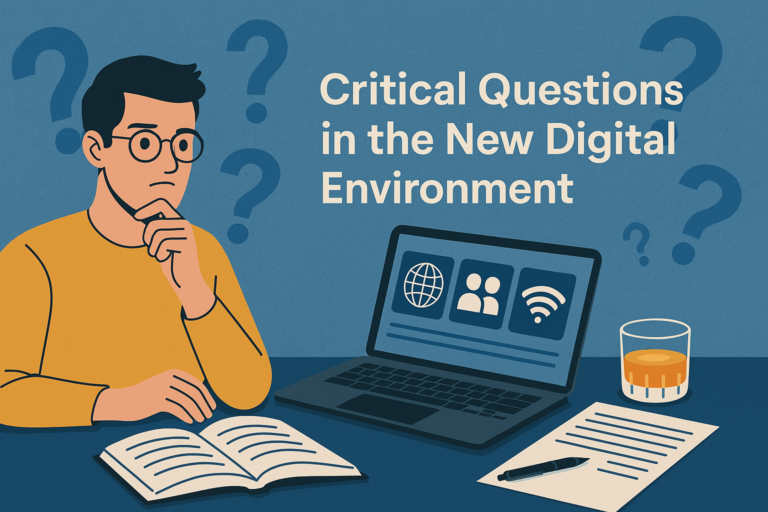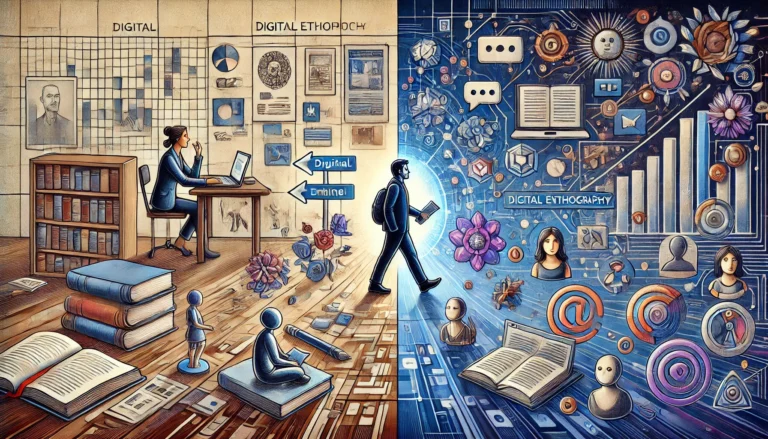Examining the Phenomena of “Hashtag Ethnography,” “Cloud Protest,” and “Media Epidemiography “
The weekly seminars on digital ethnography are, for me, like a journey to the heart of diverse cultures and societies—a journey through which we explore aspects of social life from new perspectives each time. This week, we discussed one of the most public and pervasive challenges facing contemporary societies: SOCIAL MOVEMENTS, DIGITAL POLITICS, and ACTIVISM, and the Role of Emerging Technologies in shaping and directing these movements, as well as how they are studied and translated by digital ethnographers. Examining social resistance in the modern world has always been one of my personal concerns, and this seminar helped me gain a clearer understanding of how to engage with online social movements.
Digital Tools: Fields of Resistance and Power
To begin the discussion, we reviewed the important article “Do Artifacts Have Politics?” by Langdon Winner (1980). Winner argues that some technologies are inherently political or can become political for various reasons. This perspective was deeply inspiring to me, as I realized that technology is not merely a tool, it is part of systems of power, domination, and inequality.
According to Winner, technologies are not only tools but also reproduce social and political structures, and must be analyzed through the lens of power and control.
Next, we examined the transformation of the camera’s function as one of humanity’s artifacts. A camera, initially created to capture memories, has today become a political instrument. From public CCTV cameras to body-worn police cameras, all are used for surveillance, restricting freedoms, and suppressing protests.
We also engaged in a discussion on the role of digital technologies such as social media, messaging apps, and mobile applications. Today, these technologies have become dual-use tools: on one hand, empowering people for resistance, organizing movements, and political activism; on the other, aiding governments in surveillance, censorship, and suppression.
One of my classmates shared a thought-provoking statement: “If we look carefully at contemporary life, we realize that politics is present in everything—from the smallest actions to the most complex technologies.” I echoed this view, explaining that as ethnographic researchers, we must pay attention to the social and political implications of technologies, not only when studying them but even in using them. We must ask: Who is this technology for, with what purpose, and in service of what kind of power? Does it reinforce inequality or contribute to more equal participation?
Hashtag Ethnography: A Methodology for Understanding Digital Resistance
In this session, we became familiar with the concept of “hashtag ethnography.” In this method, the researcher explores hashtags as tools for meaning-making, organizing resistance, and archiving collective memories. Despite their fluidity, hashtags are meaningful spaces for real social action. Hashtag ethnography enables the analysis of cultural and political dynamics on platforms such as Twitter. In these spaces, users engage in the production of political identity, representations of race and cultural resistance, and media critique. Analyzing these phenomena requires attention to the historical and racial contexts embedded in digital structures.
Cloud Protest and Algorithms: Emerging Political Agents
We then reviewed the article “When Algorithms Shape Collective Action” by Stefania Milan (2015). In this article, we were introduced to the concept of “cloud protest”: a form of collective action without traditional leadership, fast-moving, platform-dependent, and formed through tools like hashtags, sharing, and likes. From the perspective of digital ethnography, this article highlights the importance of analyzing user behavior, the role of algorithms, and the formation of identity and online solidarity. We learned that in cloud protests, algorithms do not merely organize data, they filter or amplify narratives and political viewpoints. Resistance strategies have also transformed; what was once accompanied by mortal danger in the streets has now turned into encryption, meaning-making, and evasion of digital tracking.
Media Epidemiography: Viral Reality and Fields of Resistance
In the final part of the seminar, we analyzed two major movements: Ferguson in the U.S. and M15 in Spain. In doing so, we encountered a new concept: “media epidemiography.” This term combines epidemic and ethnography and emphasizes the idea that we have entered an age of viral reality, an age in which protest messages spread rapidly, widely, and uncontrollably like viruses. We learned that digital spaces must be considered real ethnographic fields. To study digital political movements, we must employ qualitative methods within online environments, such as examining narratives, analyzing images and conversations, and understanding the link between online and street-based actions.
Ethnography of Online and Offline Activism
In conclusion, the seminar emphasized that, as digital ethnographers, we must not forget that the digital space is no longer merely a communication tool in the contemporary era—it is a real social field. Technology plays a key role in contemporary activism: Social networks are used for rapid organization, independent storytelling, building global networks, and protecting privacy. Today, we are witnessing forms of activism like clicktivism (symbolic online activism). Analyzing the relationship between online and offline activism requires examining the question: How do virtual actions lead to real-world events, and vice versa? Some activists serve as bridges between these two spaces, and their experiences show that separating these realms is no longer possible.
Social Pressure to Participate in Online Movements
At the end of the seminar, a challenging question was raised; one of my friends asked: “Is being visible in online protests equivalent to real political participation? Does cloud protest create a new form of social solidarity—or is it merely an added pressure to be seen, to get likes, and to pretend to be an activist?” For me, there’s still no simple answer. The digital space has blurred the boundaries—the line between real and symbolic participation, between active presence and mere visibility. On one hand, hash tagging, liking, and reposting can become powerful tools for raising awareness, building solidarity, offering comfort, and collective storytelling. On the other hand, these same actions—if lacking continuity and consequence—can lead only to the illusion of participation; a presence that is more performative than transformative. But perhaps the answer lies within this duality: cloud protest can be both creative and empowering, and shallow and deceptive—depending on how and with what intention and awareness we use it.
In the end, digital ethnography teaches us that behind every post, every image, every hashtag, lies a world of meaning, power, and sometimes silence. And it is up to us to read, analyze, and understand that activism in the digital age is not simpler—it is more complex and layered than ever.
Author: Shokoofeh Mirzaeiabdoli




